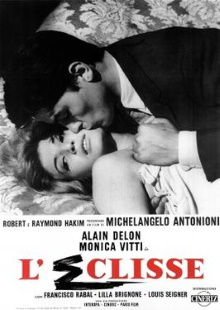Finally we get to the end of what is supposedly a trilogy by Michelangelo Antonioni. This one is no easier than any of the previous ones when it comes to figuring out what it actually means, yet the incredible power present in every scene impresses you nevertheless even as you scramble to make sense of things. Monica Vitti is the constant across all of these films and here she is at once both incredibly beautiful and incredible resistant to any simple dissection of her motivations. There are any number of ways that one could interpret this film but as some critics have pointed out perhaps it is its open-ended nature that is the real point.
Vittoria breaks off her engagement with her fiancé after a night of conversation, simply saying that she no longer loves him. Later she goes to the stock exchange in Rome to look for her mother who is a regular there. She seems to want to have a conversation with her mother but the latter is too excited about her profits at the exchange to engage with her. She does meet Piero, a young stockbroker who serves her mother. That night Vittoria does talk to her neighbor Anita about her breakup and the two of them go to the nearby apartment of another friend, Marta, to have something of a girls’ night. Marta’s family has a farm in Kenya and she gushes about how much she loves the country. However she is also extremely racist and is unamused when Vittoria puts on blackface to mess around as if she were an African. These distractions go on for a while and eventually she goes to the stock exchange again just as the market crashes, causing everyone to lose a great deal of money. Her mother is too upset to talk to her and she spends time with Piero who makes a pass for her.
Many things happen to Vittoria in the wake of her breakup, including some rather dramatic ones, such as her and Anita going on a short flight on a private plane. Every single one of the scenes are incredibly strong on its own, including Vittoria’s walk from her ex-fiancé apartment, passing by a mushroom-shaped tower. One of my favorite moments is after alighting from the plane, she is drawn to the music coming from the café right next to the landing strip. She stops at the threshold just to savor the atmosphere, then smiles and walks right back out. There’s nothing extraordinary about the café or particularly beautiful about the airfield but the combination of everything plus the gentle breeze and the music makes it feel for that one frozen moment in time like it’s the most inviting place on Earth. Even if you struggle to wrest some larger meaning out of these scenes, the expressive power in them is undeniable and makes the film incredibly attractive.
Still even while watching this, my wife and I continually had to ask ourselves what it could actually mean. There are any number of references including the threat of nuclear war as seen in the headline of a newspaper, the stillness of the streets and the mushroom-shaped tower. One might even suppose the unheard conversation between Vittoria and her former fiancé might have something to do with this too. After hearing the racism in her neighbor’s discussion of Kenya, they go out in search of her escaped dog and is it a coincidence that one of the dogs is fully black and the other fully white? But I think the larger theme is a matter of aesthetics with the title referring to an eclipse, a state that is both day and night all in one. As such the stock exchange observes a moment of silence in respect of a deceased colleague and then immediately erupts with activity, Vittoria observes a man who has just lost a great deal of money, perhaps expecting him to be depressed and sees him doodling flowers, and most of all the relationship between Vittoria and Piero begins and ends at the same time. The two of them are completely unalike and unsuited for each other, both seem to know it as well and Vittoria even states that they have to not understand each other in order to love one another. When they promise to see each other everyday, it seems that they are actually saying goodbye.
This truly is a masterful film, with its individual scenes so raw with emotion in service of a larger theme that is so abstract. I would still prefer films with more concrete themes but there is no denying the artistry and creativity of this groundbreaking work.
